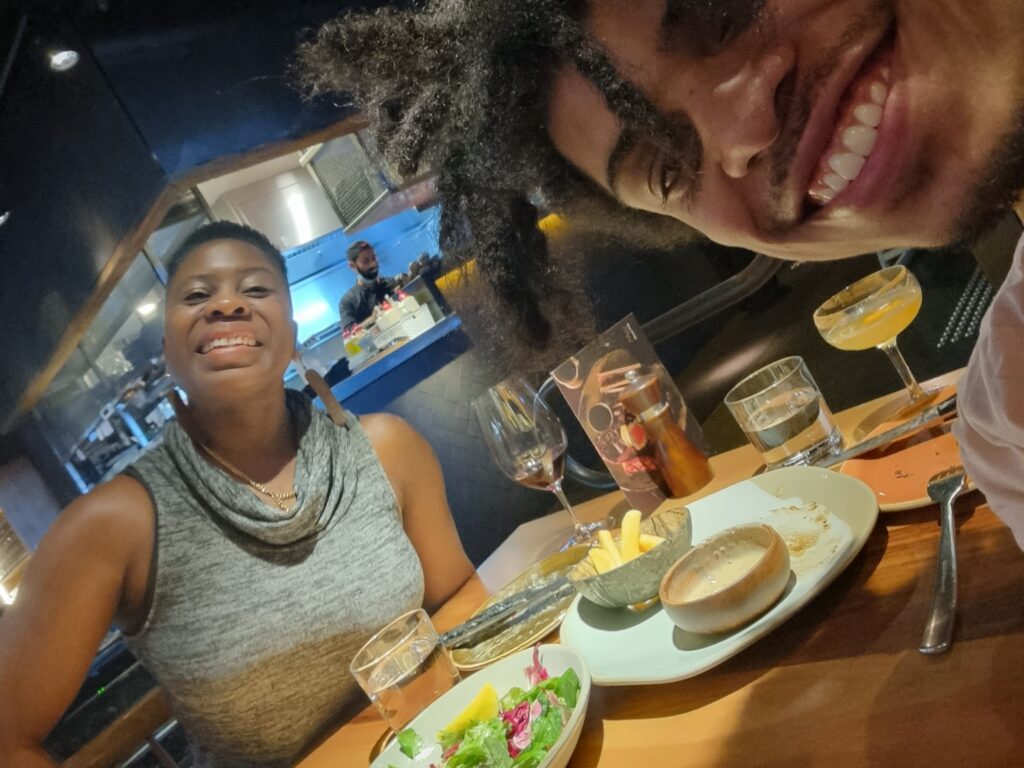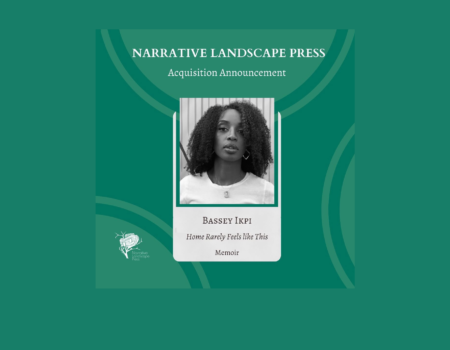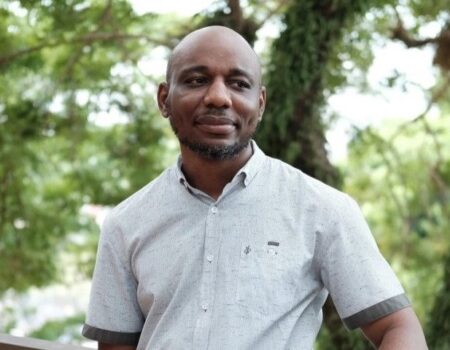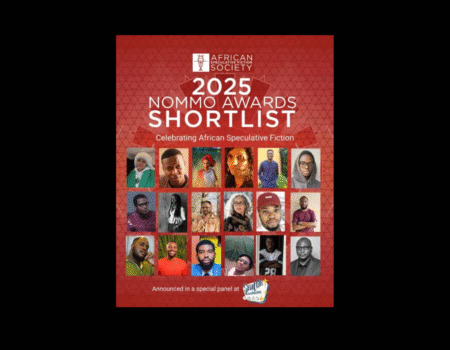Eugen M. Bacon is an African-Australian author of several novels and collections. She’s a British Fantasy Award winner, a Foreword Indies Award winner, a twice World Fantasy Award finalist, and a finalist in other awards. Eugen was announced in the honor list of the Otherwise Fellowships for ‘doing exciting work in gender and speculative fiction’. Her Danged Black Thing made the Otherwise Award Honor List as a ‘sharp collection of Afro-Surrealist work’, and was a 2024 Philip K Dick Award nominee. Eugen’s creative work has appeared worldwide, including in Apex Magazine, Award Winning Australian Writing, Fantasy, Fantasy & Science Fiction, and Year’s Best African Speculative Fiction. Visit her at eugenbacon.com.
In this interview, Eugen Bacon sits down with Ibrahim Babátúndé Ibrahim to talk about her multiple hats as a computer scientist mentality re-engineered into creative writing, a scholar, a mother, a daughter, a mentor, an editor… among other things, as well as her writing process, writing as an African living outside Africa, her present projects and much more. Come along with us!
~
IBRAHIM
Hello Eugen, it’s a pleasure to be here with you. I know you as a computer scientist, an academic, and a writer. How would you describe yourself?
EUGEN
Hi Ibrahim, the pleasure is all mine. I like to think of myself as an African Australian—the one is not exclusive from the other. I am betwixt, a sum of parts. I am a mother, a writer, an editor, a scholar, a colleague, a mentor, a friend. This is how I see myself. I am many.
IBRAHIM
How do all these multiple hats influence or enrich your craft, especially as a speculative writer?
EUGEN
I once wrote an article about art and science as the marriage of Figaro. The natural human condition is not black and white—there are greys and multi-shades of grey in-between. We get smarter when we challenge our brains. I write fluidly across hats, in fact, the one informs the other. The editor in me whispers to the writer, the scholar, the friend in me, and I can be African and Australian all at once.
I can be an author and a woman and a mother—connecting deeply with my child and other protagonists. My poet is a muse to the scholar, and the scientist reminds the author to research diligently… I find that some of the best authors of fiction and nonfiction are also poets. Do you wonder why?
IBRAHIM
I do share this belief. It’s an observation I’ve also heard many other literary figures make. You’ve lived in many countries, across many continents. What impacts do this diverse spatial occupation have on you as a person and as a writer?
EUGEN
I struggled initially with identity, a yearning to belong. I was born in Tanzania and lived in Kenya. I stayed behind for studies when my family moved back to Tanzania. The Kenyans called me the Tanzanian. And when I visited home, the Tanzanians called me the Kenyan. Later, when I moved to the UK, I was still seeking to find myself. Now, as I write myself into stories, see myself in the characters of my fiction, I feel at home with the self and the other. I am okay with my multiplicities, and they do like each other.
IBRAHIM
There are those who say that if you’ve left a place for too long, you oftentimes lose touch with that place. I say this particularly because many have said that about African writers who write from abroad. What are your thoughts on this?
EUGEN
Home is where your mother is, your father is, your family is. My parents are long gone, but my brothers and sisters are still in Tanzania and we talk all the time, cursing and swearing at each other, laughing and telling stories, sharing food, drink, milestones and traditions—you’d think we live in the same house. I have so much of my African roots and memories and bloodline—how can I lose touch with my ancestry? But I am not the same person. I have seen much, lived much, understood much, transformed much. I have family in Australia. I am who I am, the child of my father, my mother. I am an African Australian who is true to myself.
IBRAHIM
You were born in Tanzania so you’re inherently African. What’s the relationship between your writing and Tanzania in particular, and Africa as a whole?
EUGEN
If you read my fiction, you will see that it’s largely afro-centred speculative fiction. My novel MAGE OF FOOLS is an Afrofuturistic dystopian story set in a fictitious country named Mafinga—this is the actual name of a town in Tanzania. My novel SERENGOTTI is of an African migrant living in an Australian outpost named Serengotti—ring a bell?
IBRAHIM
It surely does. Let’s talk about being an African outside of Africa, especially as a creative. How do you navigate your other spaces, especially Melbourne where you now call home?
EUGEN
I discover myself everyday in my fiction. The more I write myself in, the more I see myself. I am a daughter of the Wajita people of Tanzania, and now Australia is my new home country. I am a daughter of this land—where I live belongs to the Wurundjeri and Boon-Wurrung people of the Kulin Nation.
I am a founding member of the Sauútiverse—a world inspired by the Swahili word ‘sauti’, which means voice or sound. The Sauúti shared world or universe, which we fondly call the Sauútiverse, is a fictional civilisation based on a blend of African cultural worldviews and inspirations. I have written a novel, a novella and many stories in this world. Our first anthology, MOTHERSOUND, is holding its own in awards and recognitions. I’m now co-editing a new anthology with members of the Sauúti Collective, Cheryl Ntumy and Stephen Embleton. This is one way that I navigate my other spaces—with like minded creatives.
IBRAHIM
You have written many books and won multiple awards. Asides talent, it takes a level of passion to be that successful. What does writing mean to you? How would you define your writing?
EUGEN
I discovered a passion for writing from a very early age. I understood that sometimes I needed to write it down to understand what I was feeling, thinking, curious about. I grew up in a rich culture of storytelling. The African tradition of oral storytelling, riddles, proverbs, song and dance cultivated my passion.
My father understood this thirst for knowledge, and he rewarded me with books. I am passionate about motherhood, climate action, social in/justice, stories of culture, tradition, our past, our future. Black people stories. My writing is a search, a curiosity, a question. Sometimes, at the end of the writing, what I find might not be the answer, but a better question.
IBRAHIM
But why writing? I mean, obviously you could have been anything else. You were in ICT before opting for writing.
EUGEN
I don’t just write. My two masters degrees and a doctorate have allowed me a day job I still do. I teach, I edit, work in strategic communications but I am on the cusp of a life change as a full-time writer, and I am both excited and terrified.
IBRAHIM
Most speculative fiction writers are planners, due to the often complicated nature of their stories—worldbuilding and all—but there are still some who’d tell you they’re pantsers. What’s your process?
EUGEN
I am an experimental writer who loves to play with genres and forms. Unless it’s a novel or a novella, I rarely write an outline. Short stories surprise me—I begin with a skeleton, and the characters astonish me. A novel demands a semblance of discipline, so I become a plotter for longer works. Definitely a synopsis and part-by-part breakdown.
IBRAHIM
Tell us more about your latest, SERENGOTTI.
EUGEN
SERENGOTTI is actually not my latest novel—keyword ‘novel’, as I have a prose poetry collection that’s a collaboration with Steve Simpson—TEXTURE OF SILENCE, released in December 2023. SECONDHAND DAYLIGHT, a time travel novel collaboration with Andrew Hook, was also published in October 2023.
But SERENGOTTI is an African Australian novel where I wanted to explore a few things, including hybridity (multiplicities of the self and other), and writing a second-person novel—it’s a ‘you-narrative’ that addresses the protagonist. It’s a literary mystery that deviates from my traditional speculative fiction, although it has elements of superstition, African spirituality, ghost story and magical realism. The protagonist Ch’anzu surprises even me with hir choices. Yes, pronouns zie/hir.
IBRAHIM
Are you working on anything at the moment? And I mean generally, both in writing—as in a book or story—as well as other things writing related.
EUGEN
- Two books out this 2024: A PLACE BETWEEN WAKING AND FORGETTING by Raw Dog Screaming Press, and AFRO-CENTERED FUTURISMS IN OUR SPECULATIVE FICTION—an anthology featuring fellow award-winning African authors, out by Bloomsbury Academic.
- Several projects on submission through my agent Jennie Goloboy of Donald Maass Literary Agency.
- Co-editing a new anthology, SAUÚTI TERRORS, with members of my Sauúti family Cheryl Ntumy and Stephen Embleton.
- Co-editing FISSION #4, an anthology of science fiction stories by the British Science Fiction Association.
- Two other novel projects…
I am making a convincing case for full-time writing, don’t you think?
IBRAHIM
(Laughs) You really are. How do you unwind, replenish, revitalise, rejig, refresh?
EUGEN
I swim daily. Power-walk too with music blasting on headphones. And I write—it’s so cathartic: unwinding, replenishing, revitalising, rejigging, refreshing!

IBRAHIM
So, in an alternate universe where you’re neither a writer nor working in ICT, what do you reckon you would be?
EUGEN
A mentor of sorts, perhaps. An ash-headed, wizened woman with ‘seeing’ eyes, and living in a futuristic hut.
IBRAHIM
What is something you would tell a young you who is just starting out as a writer?
EUGEN
My father once said to me, ‘Haraka ya nini, Genni wangu?’ That’s Swahili for: What’s the rush, my Genni. I feel like all my writing is a rush to outlast my mortality. My biggest panic in between writing projects is what if I never get to finish it, and nobody ever finds it?
I’d say to a younger me to hold up on those early writings when I was still discovering myself. Nobody needed to read them.
IBRAHIM
Thanks again for granting this interview. It’s been an amazing time talking to you.
EUGEN
Sure thing, Ibrahim. I’d say let’s do this again, but you’ve asked a lot of questions!
Ibrahim Babátúndé Ibrahim
Ibrahim is a Nigerian writer and editor currently based in the UK. He has won the Creative Future Writers' Award and the Quramo Writers' Prize, and has been selected for the Best Small Fictions anthology. He was a finalist for the Faber Children's FAB Prize (2023), the Miles Morland Writing Scholarship (2022), a Masters Review anthology prize (2023), and twice for the Moon City Short Fiction Award (2022 & 2023). He has also been longlisted for the Commonwealth Short Story Prize (2022), the Laura Kinsella Fellowship (2022), and the Dzanc Diverse Voices Prize (2021). He has multiple nominations for both the Pushcart Prize and the Best of the Net. Among other things, he is currently Editor at JAY Lit. He’s @heemthewriter on Twitter and Facebook, and @writtenbyheem on Instagram and Threads. His work can be found on https://linktr.ee/heemthewriter.





